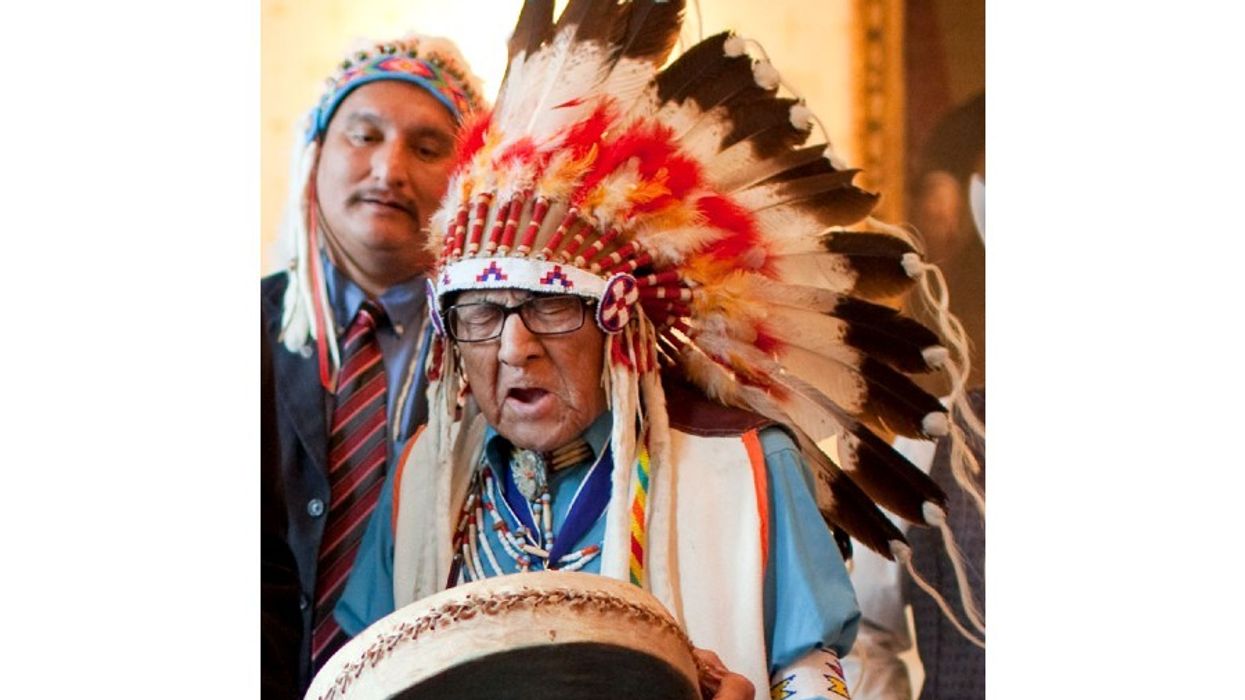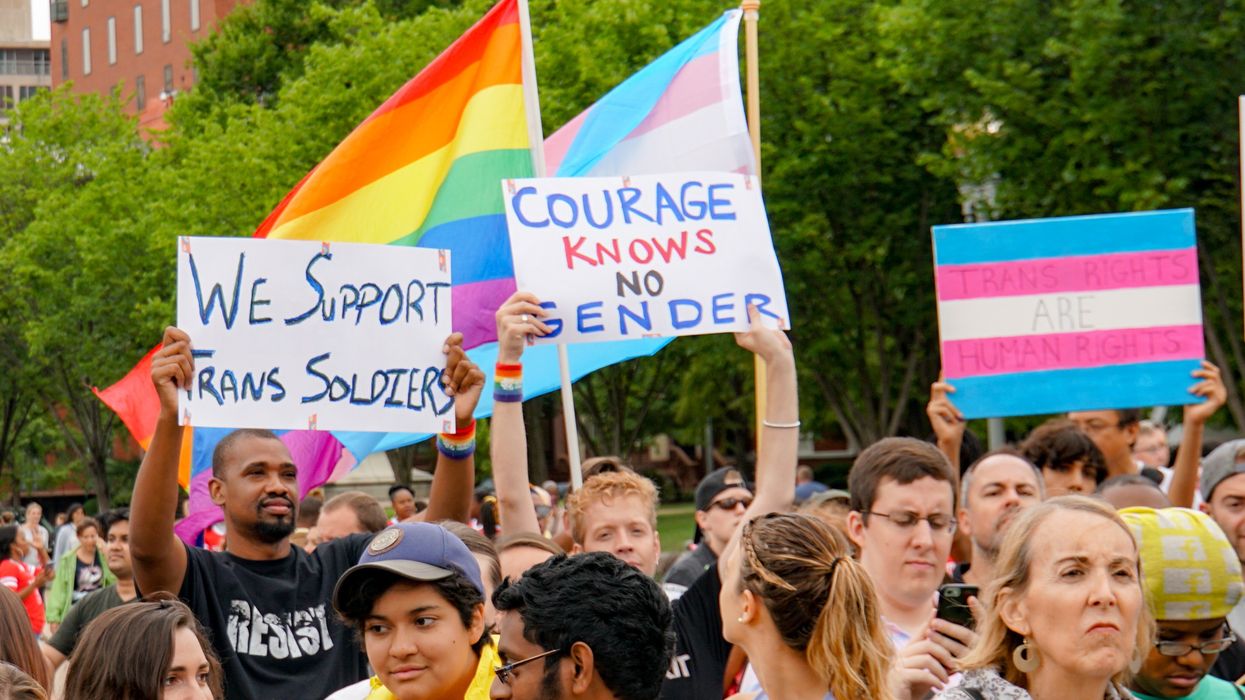There are four tasks a tribe member must accomplish in order to become a war chief of the Apsáalooke (Crow) Nation. They had to lead a victorious war party, touch a living enemy, take an enemy’s weapon, and capture an enemy’s horse. Through his service in World War II, Joseph Medicine Crow accomplished those tasks, and was honored by his tribe’s elders as the Crow Nation’s last war chief.
On October 27, 1913, Joseph Medicine Crow was born on a Apsáalooke Nation reservation in Lodge Grass, Montana. Medicine Crow was raised by his grandparents and had a very intense upbringing.
“His grandfather, Yellowtail, trained him in the old warrior ways,” recalls his son, Ronald Medicine Crow. “In wintertime, they chopped a hole in the ice and took a refreshing morning plunge. Then Yellowtail told him to run a hundred yards in the snow barefoot. In summer and fall, Dad learned hunting and tracking skills.”
While he absorbed the teachings from his family and tribe, Medicine Crow also pursued higher education. In 1939, he earned his master’s in anthropology with an archaeology minor at USC Dornsife, becoming the first male of the Apsáalooke Nation to get a masters degree. As he was studying for his doctorate, he enlisted for military service in 1942 and was sent into combat in Europe in 1943.
Throughout his military tenure as part of the 103rd Infantry Division, Medicine Crow would paint two red stripes on his arm under his uniform. He also wore a yellow eagle feather under his helmet, using it as a charm to protect him from harm.
His military career hit a number of milestones. He first led a seven-soldier squad to steal First, he led a seven-man squad to carry explosives along the Siegfried Line, attacking German enemies through artillery fire. Shortly after, as his group was taking over a German-occupied town, he literally bumped into a German soldier and disarmed him of his rifle. The two engaged in hand-to-hand combat, in which Medicine Crow choked the German soldier and released him after the soldier begged for his mother.
“I let go of him and got my rifle back, and he became my prisoner,” he recounted to his son. “We sat down, away from all the shouting and fighting, and I shared a cigarette with him.”
Later, after conferring with his Commanding Officer, Medicine Crow scouted ahead to a pasture where the enemy's horses were resting. He would mount one of the horses and let out cry, stirring the horses into a stampede as he led them away from the enemy camp. As German soldiers shot at Medicine Crow and chased after 50 or so horses, they were incapacitated by Allied Forces.
- YouTubeyoutu.be
Without intentionally doing so, Joseph Medicine Crow accomplished the four deeds necessary to earn the title of War Chief from his tribe. Along with that honor, he would receive a Bronze Star, a French Legion of Honor, honorary doctorates, and eventually a Presidential Medal of Freedom among other accolades.
After his military service, Dr. Medicine Crow acted as an anthropologist and historian for the Apsáalooke Nation while also working as a land appraiser for the Bureau of Indian Affairs. His work was to not only keep the history and traditions of his tribe alive, but also to act as a peaceful bridge between Indigenous peoples and white people.
He is quoted as saying, “‘I live in two worlds: the Indian world and the white world. There is a middle line that joins those two worlds together. …I walk that line and take what’s good from both.”
Dr. Joseph Medicine Crow would pass away on April 3, 2016, living to the ripe old age of 102. In terms of his memory upon his death, the White House issued a statement saying that his life is defined as a bacheitche, translated from Apsáalooke Nation’s language simply as “a good man.”


















 A couple sleeping in their tentCanva
A couple sleeping in their tentCanva
 Clinic are factoring more and more into health planning in the US.
Clinic are factoring more and more into health planning in the US. 
 Representative Image: Making pizzas for hungry people. Pexels I Photo by Jvxhn Visuals
Representative Image: Making pizzas for hungry people. Pexels I Photo by Jvxhn Visuals Representative Image Source: Pexels I Photo by Polina Tankilevitch
Representative Image Source: Pexels I Photo by Polina Tankilevitch Representative Image: Is there anything better than pepperoni? Pexels I Photo by Pixabay
Representative Image: Is there anything better than pepperoni? Pexels I Photo by Pixabay "This story made my whole night better." Reddit I
"This story made my whole night better." Reddit I 
 Model Lauren Chan's 2025 Sports Illustrated Swimsuit issue cover, photographed by Ben Watts. Ben Watts/Sports Illustrated,
Model Lauren Chan's 2025 Sports Illustrated Swimsuit issue cover, photographed by Ben Watts. Ben Watts/Sports Illustrated, 


 Fisherman at duskCanva
Fisherman at duskCanva Water rescue teamCanva
Water rescue teamCanva Pulling someone to safetyCanva
Pulling someone to safetyCanva You never know what you may catch in the waterCanva
You never know what you may catch in the waterCanva
